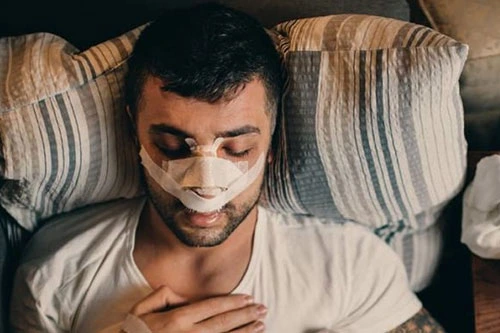Having a rhinoplasty can be a life-changing experience, but did you know that it can also affect your sleep? After undergoing this popular cosmetic procedure, it’s common for patients to experience difficulty getting quality sleep. But fear not, because in this article, we will guide you on how to achieve restful nights after rhinoplasty.
Sleep is essential for the proper healing and recovery of the body, and it’s even more crucial after a surgical procedure like rhinoplasty. The changes made to your nasal structure may cause congestion, swelling, or discomfort, making it challenging to find a comfortable sleeping position.
In this article, we will explore various tips and techniques to help you optimize your sleep post-rhinoplasty. From adjusting your sleeping position to utilizing nasal sprays and pillows specifically designed for post-operative care, we’ve got you covered.
We understand the importance of a good night’s sleep for your overall well-being and recovery. So, whether you’ve already undergone rhinoplasty or are considering it in the future, stay tuned for practical advice on how to achieve quality sleep and wake up feeling refreshed and rejuvenated.
The importance of quality sleep after rhinoplasty
Sleep is crucial for the proper healing and recovery of the body, and it becomes even more essential after a surgical procedure like rhinoplasty. During sleep, our bodies repair and regenerate, allowing us to wake up feeling refreshed and rejuvenated. However, the changes made to your nasal structure during rhinoplasty can cause congestion, swelling, or discomfort, making it challenging to find a comfortable sleeping position.
Understanding the impact of rhinoplasty on sleep
Rhinoplasty involves reshaping the nose to improve its appearance or functionality. While the surgery itself is performed under anesthesia, the recovery phase can significantly impact your sleep patterns. The nasal passages may become congested or swollen, making it difficult to breathe through the nose. This can lead to mouth breathing, snoring, or even sleep apnea, a condition characterized by pauses in breathing during sleep. Additionally, pain, discomfort, and swelling can make it hard to find a comfortable position, further disrupting your sleep.
Common sleep issues after rhinoplasty
After rhinoplasty, you may encounter several sleep-related challenges. These can include:
1. Congestion and Nasal Obstruction: Swelling and congestion in the nasal passages can make it difficult to breathe through your nose, leading to mouth breathing and disrupted sleep.
2. Pain and Discomfort: Rhinoplasty can cause pain and discomfort, particularly in the first few days post-surgery. This can make it challenging to find a comfortable sleeping position.
3. Sleep Apnea: In some cases, rhinoplasty can worsen or trigger sleep apnea, a condition where breathing pauses during sleep. If you experience symptoms such as loud snoring, gasping for breath, or excessive daytime sleepiness, consult your doctor immediately.
4. Anxiety and Stress: The recovery period after rhinoplasty can be emotionally challenging. Anxiety and stress can interfere with your ability to fall asleep or stay asleep throughout the night.
Tips for achieving restful sleep after rhinoplasty
While it may take some time to adjust to a new sleep routine after rhinoplasty, there are several strategies you can employ to achieve restful nights. Here are some tips to help you optimize your sleep post-rhinoplasty:
1. Adjust Your Sleeping Position
Finding a comfortable sleeping position is crucial for quality sleep after rhinoplasty. Elevating your head and upper body can help reduce swelling and congestion. Consider using extra pillows or a wedge pillow to prop yourself up at a 30 to 45-degree angle. This position can promote better airflow and alleviate discomfort.
2. Utilize Nasal Sprays and Rinses
Nasal sprays and saline rinses can help alleviate congestion and keep the nasal passages moisturized. Consult your surgeon or healthcare provider for recommendations on using saline solutions or nasal sprays specifically designed for post-operative care. Follow the instructions provided to ensure safe and effective use.
3. Invest in Post-Operative Pillows
Specialized pillows designed for post-operative care can provide optimal support and comfort during sleep. These pillows are contoured to accommodate the shape of your head, neck, and shoulders, reducing pressure on the surgical site and promoting better sleep. Look for pillows made from memory foam or other supportive materials.
4. Create a Sleep-Friendly Environment
Your sleep environment plays a crucial role in the quality of your sleep. Create a calm and relaxing atmosphere in your bedroom by keeping it dark, quiet, and cool. Use blackout curtains or an eye mask to block out any unwanted light, and consider using earplugs or a white noise machine to mask any disruptive sounds.
5. Manage Pain and Discomfort
Pain and discomfort are common after rhinoplasty, but managing them effectively can greatly improve your sleep quality. Take prescribed pain medication as directed by your surgeon, and consider applying cold compresses or using over-the-counter pain relievers to alleviate any discomfort.
6. Incorporate Relaxation Techniques
Relaxation techniques can help you unwind before bed and promote better sleep quality. Consider practicing deep breathing exercises, meditation, or gentle stretching to relax your body and mind. You can also try listening to calming music or using aromatherapy with essential oils known for their sleep-promoting properties, such as lavender or chamomile.
7. Support Sleep with Proper Nutrition and Hydration
Maintaining a healthy diet and staying hydrated can contribute to better sleep after rhinoplasty. Avoid consuming caffeine or alcohol close to bedtime, as they can interfere with your sleep. Instead, opt for sleep-promoting foods such as bananas, almonds, turkey, or herbal teas known for their calming effects.
Creating a sleep-friendly environment post-rhinoplasty
While some sleep disturbances after rhinoplasty are normal, persistent or severe sleep issues may require professional intervention. If you experience any of the following, it’s essential to consult your surgeon or healthcare provider:
– Excessive snoring or gasping for breath during sleep
– Difficulty breathing through your nose for an extended period
– Severe pain or discomfort that disrupts your sleep
– Persistent insomnia or excessive daytime sleepiness
– Signs of infection, such as fever, redness, or discharge from the surgical site
Your surgeon can evaluate your symptoms and provide appropriate guidance or referral to a sleep specialist if necessary.
Managing pain and discomfort for better sleep
Achieving quality sleep after rhinoplasty is crucial for your overall well-being and recovery. By implementing the tips and techniques discussed in this article, you can optimize your sleep and wake up feeling refreshed and rejuvenated. Remember to be patient with yourself during the healing process and consult your surgeon or healthcare provider if you have any concerns or persistent sleep issues. Restful nights await you, and with proper care, your journey to a better sleep post-rhinoplasty will be a smooth one.
Incorporating relaxation techniques for better sleep quality
Having a rhinoplasty can be a life-changing experience, but did you know that it can also affect your sleep? After undergoing this popular cosmetic procedure, it’s common for patients to experience difficulty getting quality sleep. But fear not, because in this article, we will guide you on how to achieve restful nights after rhinoplasty.
Sleep is essential for the proper healing and recovery of the body, and it’s even more crucial after a surgical procedure like rhinoplasty. The changes made to your nasal structure may cause congestion, swelling, or discomfort, making it challenging to find a comfortable sleeping position.
In this article, we will explore various tips and techniques to help you optimize your sleep post-rhinoplasty. From adjusting your sleeping position to utilizing nasal sprays and pillows specifically designed for post-operative care, we’ve got you covered.
We understand the importance of a good night’s sleep for your overall well-being and recovery. So, whether you’ve already undergone rhinoplasty or are considering it in the future, stay tuned for practical advice on how to achieve quality sleep and wake up feeling refreshed and rejuvenated.
Supporting sleep with proper nutrition and hydration
After rhinoplasty, it’s normal to experience some pain and discomfort. This can make it challenging to get a good night’s sleep. However, there are several strategies you can employ to manage pain and discomfort and improve your sleep quality.
First and foremost, make sure to follow your surgeon’s post-operative care instructions. This may include taking prescribed pain medication or using over-the-counter pain relievers such as acetaminophen. By effectively managing your pain, you can create a more conducive environment for sleep.
In addition to medication, applying cold compresses to your nose can help reduce swelling and alleviate discomfort. Wrap an ice pack in a clean cloth and gently place it on the affected area for short intervals. This can provide temporary relief and promote better sleep.
Lastly, consider elevating your head while sleeping. Prop yourself up with an extra pillow or invest in a wedge-shaped pillow that is specifically designed for post-operative care. This elevation can help reduce nasal congestion and facilitate better breathing, allowing you to sleep more comfortably.
When to seek professional help for sleep issues after rhinoplasty
Relaxation techniques can play a significant role in improving your sleep quality after rhinoplasty. When you’re relaxed, both your mind and body are more likely to enter a state of restful sleep. Here are a few techniques you can try:
1. Deep breathing exercises: Before bed, engage in deep breathing exercises to calm your mind and relax your body. Breathe in slowly through your nose, hold your breath for a few seconds, and then exhale through your mouth. Repeat this process several times, focusing on the sensation of your breath entering and leaving your body.
2. Progressive muscle relaxation: Lie down in a comfortable position and systematically tense and relax each muscle group in your body. Start with your toes and work your way up to your head, tensing each muscle for a few seconds before releasing the tension. This technique can help release physical tension and promote better sleep.
3. Meditation and mindfulness: Practice meditation or mindfulness techniques before bed to quiet your mind and promote relaxation. Find a quiet space, close your eyes, and focus on your breath or a specific object. Allow any thoughts or distractions to pass without judgment, bringing your attention back to the present moment.
By incorporating these relaxation techniques into your nighttime routine, you can create a more peaceful and conducive environment for sleep.
Conclusion
Proper nutrition and hydration play vital roles in promoting quality sleep and aiding in the recovery process after rhinoplasty. Here are some tips for supporting your sleep through your diet:
1. Avoid caffeine and stimulants: Limit your intake of caffeine-containing beverages like coffee, tea, and energy drinks, especially in the afternoon and evening. These substances can interfere with your sleep and make it harder to fall asleep or stay asleep.
2. Eat a balanced diet: Consume a well-balanced diet that includes a variety of fruits, vegetables, lean proteins, and whole grains. Incorporate foods that are rich in sleep-promoting nutrients like magnesium and tryptophan, such as bananas, almonds, and turkey.
3. Stay hydrated: Drink an adequate amount of water throughout the day to prevent dehydration, which can negatively impact your sleep. However, be mindful of your fluid intake close to bedtime to avoid frequent trips to the bathroom during the night.
By paying attention to your nutrition and hydration, you can support your body’s healing process and improve your sleep quality after rhinoplasty.



